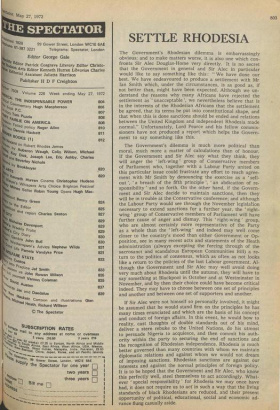SETTLE RHODESIA
The Government's Rhodesian dilemma is embarrassingly obvious; and to make matters worse, it is also one which confronts Sir Alec Douglas-Home very directly. It is no secret that the Government in general and Sir Alec in particular would like to say something like this : "We have done our best. We have endeavoured to produce a settlement with Mr Ian Smith which, under the circumstances, is as good as, if not better than, might have been expected. Although we understand the reasons why many Africans have rejected the settlement as' unacceptable ', we nevertheless believe that is in the interests of the Rhodesian Africans that the settlement be agreed, that its terms be put into constitutional shape, and that when this is done sanctions should be ended and relations between the United Kingdom and independent Rhodesia made normal." Unfortunately, Lord Pearce and his fellow commissioners have not produced a report which helps the Government to say something like this.
The Government's dilemma is much more political than moral, much more a matter of calculations than of honour. If the Government and Sir Alec say what they think, they will anger the 'left-wing' group of Conservative members of Parliament who, together with a Labour Party united on this particular issue could frustrate any effort to reach agreement with Mr Smith by denouncing the exercise as a " sellout ', a breach of the fifth principle ', an abdication of responsibility' and so forth. On the other hand, if the Government and Sir Alec decide to maintain sanctions, then they will be in trouble at the Conservative conference; and although the Labour Party would see through the November legislation necessary to extend sanctions for a further year, the 'rightwing' group of Conservative members of Parliament will have further cause of anger and dismay. This 'right-wing' group, who are almost certainly more representative of the Party as a whole than the ' left-wing ' and indeed may well come closer to the country's mood than either Government or Opposition, see in many recent acts and statements of the Heath administration (always excepting the forcing through of the sacrosanct and scandalous European Communities Bill) a return to the politics of consensus, which as often as not looks like a return to the policies of the last Labour government. Although the Government and Sir Alec may well avoid doing very much about Rhodesia until the autumn, they will have to say something at Blackpool in October and at Westminster in November, and by then their choice could have become critical indeed. They may have to choose between one set of principles and another and between one set of supporters and another.
If Sir Alec were not himself so personally involved, it might be assumed that he would stand firm on the principles he has many times enunciated and which are the basis of his concept and conduct of foreign affairs. In this event, he would bow to reality, cast thoughts of double standards out of his mind, deliver a stern rebuke to the United Nations, do his utmost to persuade Nigeria to acquiesce, and then commit his authority within the party to securing the end of sanctions and the recognition of Rhodesian independence. Rhodesia is much better governed than many countries with whom we maintain diplomatic relations and against whom we would not dream of imposing sanctions. Rhodesian sanctions are against our interests and against the normal principles of foreign policy. It is to be hoped that the Government and Sir Alec, who know this perfectly well, steel themselves to act accordingly. Whatever special responsibility ' for Rhodesia we may once have had, it does not require us to act: in such a way that the living standards of black Rhodesians are reduced, and their present opportunity of political, educational, social and economic advance flung casually aside.










































 Previous page
Previous page